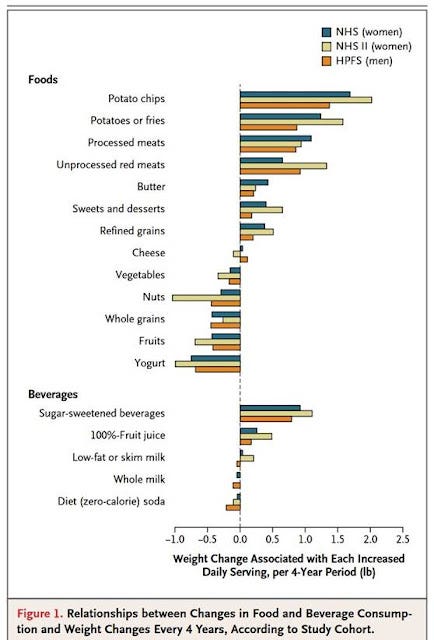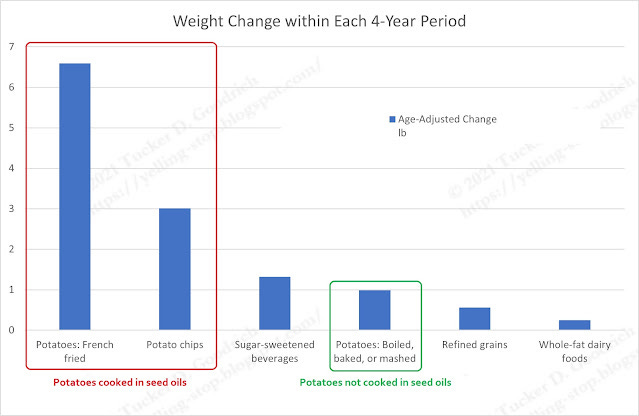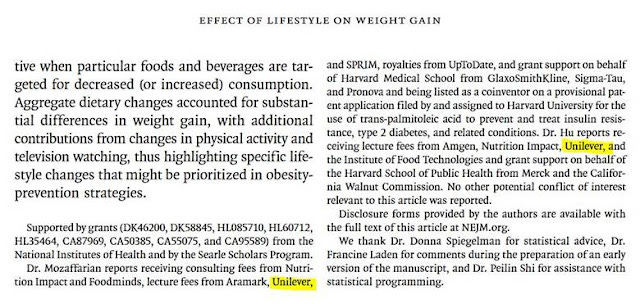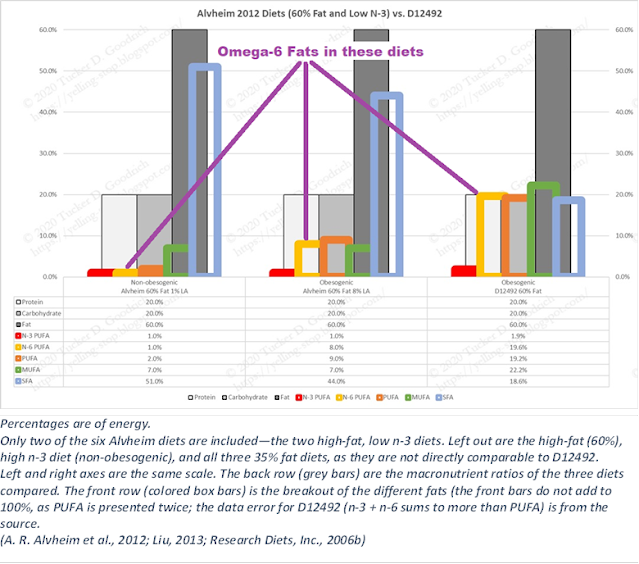What Is The Most Fattening Food?
How serendipity uncovered a case of research fraud and the cause of obesity.
I came across this paper recently:
"Changes in Diet and Lifestyle and Long Term Weight Gain in Women and Men” (Mozaffarian et al., 2011)
From the illustrious New England Journal of Medicine.
The most notable authors (apologies to the rest!) are F. B. Hu—Frank Hu, the current Frederick J. Stare Professor of Nutrition and Epidemiology at the Harvard T. H. Chan School of Public Health (Harvard University, 2021a); D. Mozaffarian—Dariush Mozaffarian, Dean of Tufts Friedman School of Nutrition Science and Policy (Tufts University, 2021); and W. C. Willett—Walter Willett, the previous Frederick J. Stare Professor of Nutrition and Epidemiology at the aforementioned Harvard School (Harvard University, 2021b), and until 2017 the chair of the department of nutrition—per Wikipedia as of this writing.
The three are the Holy Trinity of the Nutrition Establishment of the United States, and, by extension, the world. Combined, the three have written countless papers, editorials, and opinion pieces on the subject of health and nutrition.
This paper was a huge effort:
“We performed prospective investigations involving three separate cohorts that included 120,877 U.S. women and men who were free of chronic diseases and not obese at baseline, with follow-up periods from 1986 to 2006, 1991 to 2003, and 1986 to 2006.”
So this is a neat paper to find! What changes contribute most to weight gain, a topic of great concern to us all?
“On the basis of increased daily servings of individual dietary components, 4-year weight change was most strongly associated with the intake of potato chips (1.69 lb), potatoes (1.28 lb), sugar-sweetened beverages (1.00 lb)...”
So it’s potatoes! Potatoes are the most fattening food! Boy, that was easy.
But wait a minute, if one looks at their data for potatoes, one notices something very odd:
Analysis
As you can see, they group ‘French fried’ potatoes together with ‘Boiled, baked, or mashed’ potatoes. But they group ‘Potato chips’ separately. And what’s most notable, is that there is a huge difference between ‘Boiled, baked, or mashed’ and the other two categories of potatoes, as far as weight gain goes. I decided to put a graph together:
As you can see, the worst individual item is French fried potatoes. Second is Potato chips, and the rest of the potatoes come in somewhere down the pack, between Sugar-sweetened beverages and Refined grains. Here’s another graph, where I drop the arbitrary (and misleading) Potatoes category, and the ‘Multivariable-Adjusted Change’ (which are likely bogus adjustments, as statistical adjustment is an art, not a science) to see what we really have here:
I dropped the Potatoes category because grouping ‘French fried’ together with ‘Boiled, baked, or mashed’ is very misleading, as it makes potatoes per se seem much worse than they are.
Now, ‘Boiled, baked, or mashed’ is another arbitrary sub-grouping of potatoes. A boiled potato is a very different thing from the other two categories, as it’s generally eaten on its own, without any added fat. Baked or mashed potatoes are generally served with some form of ‘Whole-fat dairy foods’—I checked a bunch of recipes and restaurant nutrition information on Google, and that seems to be a pretty fair statement. As you can see, ‘Whole-fat diary foods’, which includes butter, cheese, and whole-fat milk (see Table 2 above) is not particularly fattening on its own, as the authors note.
“Among Swedish women, higher intakes of whole milk and cheese were inversely associated with weight gain; as in our study, significant associations with weight gain were not seen for other dairy foods.” (Mozaffarian et al., 2011)
It’s unlikely that adding ‘Whole-fat dairy foods’ to a potato is going to make something that’s suddenly super-fattening, and that is not suggested by the data, but it might mean that a mashed potato with milk and butter (again, Google for recipes and nutrition info) is more fattening than a boiled potato, just due to the additive nature of the ingredients.
“A secondary analysis of potato subtypes showed that weight changes were positively associated with increases in the consumption of french fries (3.35 lb) and of boiled, baked, or mashed potatoes (0.57 lb) [numbers are multivariable-adjusted change].” (Mozaffarian et al.,2011)
So obviously the authors noticed this differential between the different varieties of potatoes as well, as they bothered to do a secondary analysis.
Considering the composition of a potato, which is mostly starch, one would expect it to have similar qualities to ‘Refined grains’, which are also mostly starch. And the ‘Boiled, baked, or mashed’ is indeed in the same neighborhood as ‘Refined grains’. I would expect that boiled potatoes alone should be right in the middle of refined grains, and the other two (baked and mashed) to be a bit higher, due to the added ‘Whole-fat dairy foods’, given the data presented.
But why are the other two categories of potatoes 6.5 and 3 times as fattening? What is the difference in ingredients between a boiled potato and a French fried potato?
The best-selling French fries, I’m assuming, are McDonald’s (McDonalds, Inc, 2021). The best-selling potato chips, according to Google again, are Lay’s (Frito-Lay North America, Inc., 2021). So here is a comparison of potatoes: boiled (Condé Nast, 2018a), mashed (Condé Nast, 2018b), Lay’s, and McDonald’s:
And the ingredients? Well, the boiled potato is just a potato. The mashed potato includes butter, milk, and salt. The McDonald’s and Lay’s potatoes both list vegetable oils as the second ingredient.
McDonald’s:
Lays has a much simpler list of ingredients:
Now, the level of fatness doesn’t seem to correspond exactly to the fats, but all we have for the McDonald’s and Lay’s products is “Other fatty acids”; we don’t know exactly what they contained, and it likely varied over the course of this study. (Even the ingredients for Canadian McDonald’s fries differ from the American ingredients.)
The authors continue:
“Foods that contained higher amounts of refined carbohydrates — whether these were added (e.g., in sweets and desserts) or were not added (e.g., in refined grains) — were associated with weight gain in similar ways, and potato products (which are low in sugars and high in starches) showed the strongest associations with weight gain.” (Mozaffarian et al., 2011)
As the graph above shows, this is not correct. Potatoes become more fattening when the carbohydrate content is reduced, so long as it is replaced with vegetable oils. And it is a major effect, several times as fattening as potatoes containing either no added fats or non-fattening added dairy fats. And as we can see, this effect does not occur with higher levels of saturated fatty acids (SFA) as seen in the potato + ‘Whole-fat dairy foods’ combinations.
The summary graph (Figure 1) of the paper perpetuates this misrepresentation.
Note that the potato-weight gain connection exists across all three data sets they examined. If ‘Boiled, baked, or mashed’ were grouped separately from ‘fries’ or if ‘Fried potatoes’ were listed separately from other potatoes as I have done in the graphs above, it would be quite clear that there is something very different, and very obesogenic about fried potatoes, and given the simple list of ingredients in fried potato products, the problem must be the added vegetable oils.
So, according to these authors, the answer to my question, “What is the most fattening food?” is:
Vegetable oils.
Since mass-produced potato products don’t use olive or other fruit oils, the answer is more specifically:
Seed oils.
P.S. Here's a graphic I produced later that makes it perfectly clear which categories of potatoes from the chart above are obesogenic:
Data from (Mozaffarian et al.; 2011)
Motivation
It’s of course speculation as to why these investigators, who obviously noticed that fried potatoes were unusually fattening compared to non-fried potatoes, didn’t continue to drill down as I have done here.
But one clue to motivation is always the most obvious one: money.
The two most significant authors of this paper report having received fees from Unilever. Unilever, once the biggest producer of vegetable oils in the world, was in 2011 at the tail end of a years-long effort to divest itself of its vegetable oils businesses (Gelski, 2013). Unilever continues to be a major producer of foods that use vegetable oils as an ingredient.
Dr. Mozaffarian, especially, has produced multiple studies on vegetable oils, many of which have been funded by Unilever and Bunge, another major producer of vegetable oils (Otto et al., 2015). Drs Hu and Willett recently published jointly with several employees of Unilever, funded in part by Unilever (Zong et al., 2019), in which they reported:
“Total n-6 PUFAs were associated with a higher risk for type 2 diabetes in the age-adjusted model, but the associations were greatly attenuated after controlling for established type 2 diabetes risk factors, including BMI…” (Zong et al., 2019)
If, as appears to be the case in (Mozaffarian et al., 2011), “total n-6 PUFAs”, aka seed oils, are also causative in obesity, then adjusting for BMI would be invalid, as one cannot adjust by a factor that is involved in the causative pathway. To do so would have the effect of hiding the involvement of seed oils in both obesity and type 2 diabetes.
One can certainly imagine why a company that sells seed oils and products containing them might be interested making that relationship less than obvious.
Given this appearance of impropriety, it’s ironic that Dr. Willett had, and Dr. Hu has, the title ‘Frederick J. Stare Professor of Nutrition and Epidemiology’. Dr. Stare achieved a posthumous fame in (Kearns et al., 2016):
“Sugar Industry and Coronary Heart Disease Research: A Historical Analysis of Internal Industry Documents”
That was published in another prestigious medical journal, Journal of the American Medical Association: Internal Medicine. I’ll let this news article speak for the content of that paper:
“Sugar industry secretly paid for favorable Harvard research” (Bailey, 2016)
“Her paper recounts how two famous Harvard nutritionists, Dr. Fredrick Stare and Mark Hegsted, who are now deceased, worked closely with a trade group called the Sugar Research Foundation, which was trying to influence public understanding of sugar’s role in disease.”
See this post for more:
Does Linoleic Acid Induce Obesity? Part 1
[P.S. Part 2: Roux-en-Y Gastric Bypass and 4-Hydroxynonenal.] Introduction OK folks, into the wayback machine.Thanks for reading Tucker Goodrich: yelling Stop! Subscribe for free to receive new posts and support my work. In 2010 I stopped eating seed oils, and saw a chronic inflammatory bowel disease resolve in days:
P.S.
Thanks to JR in the comments to this post, for reading the comments in the online version of this paper:
And finding this:
All potatoes are not created equal
Drs. Mozaffarian et al have extended the important observation that the selective nutrient content of foods may be important determinants of weight gain. However, the authors missed an opportunity to critically examine the differences in the nutrient composition of french fries and chips compared to other potatoes. French fries had a 6-fold greater effect in weight gain and also differ from potatoes by having much greater omega-6 linoleic acid (7 gm/ 100 gm) vs. 0.03 gm/ 100 gm for baked potatoes (USDA Nutrient Database V 23). Potato chips have 13.4 gm of omega-6 linoleic acid /100 gm. Linoleic acid has been identified as a precursor for endogenous cannabinoids that are critical mediators of appetite and, in excess impair satiety and induce weight gain via mechanisms similar to pharmacological cannabinoids. In 1966 Dayton et al. reported linoleic acid induced weight gain in the LA Veterans study [(Dayton et al., 1966)]. Perhaps this difference in these biologically active fats distinguishes these potatoes and not the difference in total fat calories; the authors state that clear patterns were not seen in the relationship between weight gain and the energy density of the dietary components.
Joseph Hibbeln
Dr. Hibbeln is of course an investigator at the National Institutes of Health (NIH), who published the following year a study titled:
"Dietary linoleic acid elevates endogenous 2-AG and anandamide and induces obesity" (Alvheim et al., 2012)
P.S. 2024/08/28: Comment Deleted.
This comment has been removed from the NEJM site. Luckily, I kept a copy.
P.S. 2025/02/06: Another Comment and a Response.
So the online comments including that of Hibbeln above seem to have been deleted, but they also received some letters to the editor.
You can see that Dr. Bistrian has fallen for their misdirection, and concludes that all potatoes are fattening.
“Overall, weight gain was significantly increased with the consumption of potato chips, french fries, and potatoes.” (Bistrian, 2011)
However, he notes that fat’s really the problem, not the potatoes.
“Generally, about % of the calories in potato chips are from fat; the percentage of calories from fat in french fries approaches that level, and boiled, baked, or mashed potatoes often have substantial added calories from fat. A major concern is that potatoes may be shunned as an obesity-fostering food, when added fat is the etiologic factor.” (Bistrian, 2011)
Mozaffarian et al. reply:
“In our analysis of potato subtypes, the greatest weight gain was associated with french fries, then potato chips, then boiled, baked, or mashed preparations...
“French fries and potato chips are often consumed in larger portions than other preparations of potatoes, and previously they often contained industrial trans fats. The use of trans fats, which has been greatly reduced in the United States, may have independent effects on the risk of obesity.” (Bistrian, 2011)
Of course trans fats in such foods would be consumed with a much larger dose on Ω-6 fats, so we have a bit of confounding.
Their rebuttal to the added fat concern is to note:
“Blaming only toppings or “added fat” is unsupported. Butter was associated with less weight gain than potatoes, and cheese had no association…. Weight gain was positively associated with fat-free foods, including refined grains and soda, unassociated with whole-fat milk and cheese, and inversely associated with nuts.” (Bistrian, 2011)
They note that French fries have only three ingredients, but the obvious inference from this data: that seed oils are causing the obesity, eludes them.
“Ironically, baked or low-fat french fries and potato chips have reduced amounts of their healthiest component — unsaturated vegetable oils — leaving mostly starch and salt.” (Bistrian, 2011)
As I noted in my original post, potatoes become more fattening when the carbohydrate content is reduced, so long as it is replaced with vegetable oils.
References
Alvheim, A. R., Malde, M. K., Osei‐Hyiaman, D., Hong, Y. H., Pawlosky, R. J., Madsen, L., Kristiansen, K., Frøyland, L., & Hibbeln, J. R. (2012). Dietary Linoleic Acid Elevates Endogenous 2-AG and Anandamide and Induces Obesity. Obesity, 20(10), 1984–1994. https://doi.org/10.1038/oby.2012.38
Bailey, M. (2016, September 12). Sugar industry secretly paid for favorable Harvard research [News]. STAT. https://www.statnews.com/2016/09/12/sugar-industry-harvard-research/
Bistrian, B. R., Jornayvaz, F. R., Mozaffarian, D., Willett, W. C., & Hu, F. B. (2011). Diet, Lifestyle, and Long-Term Weight Gain. New England Journal of Medicine, 365(11), 1058–1059. https://doi.org/10.1056/NEJMc1108379
Condé Nast. (2018a). Potatoes, boiled, cooked in skin, flesh, without salt [Informational]. Nutrition Facts & Calories. https://nutritiondata.self.com/facts/vegetables-and-vegetable-products/2556/2
Condé Nast. (2018b). Potatoes, mashed, home-prepared, whole milk and butter added [Informational]. Nutrition Facts & Calories. https://nutritiondata.self.com/facts/vegetables-and-vegetable-products/3004/2
Dayton, S., Hashimoto, S., Dixon, W., & Pearce, M. L. (1966). Composition of lipids in human serum and adipose tissue during prolonged feeding of a diet high in unsaturated fat. Journal of Lipid Research, 7(1), 103–111. https://www.jlr.org/article/S0022-2275(20)39591-2/pdf
Frito-Lay North America, Inc. (2021). LAY’S® Classic Potato Chips [Advertisement]. LAY’S®. http://www.lays.com/products/lays-classic-potato-chips
Gelski, J. (2013, July 26). AAK buys oils and fats supplier in Turkey from Unilever [News]. Food Business News. https://www.foodbusinessnews.net/articles/2547-aak-buys-oils-and-fats-supplier-in-turkey-from-unilever
Harvard University. (2021a). Frank Hu’s Faculty Website [Advertisement]. Harvard T.H. Chan School of Public Health. https://www.hsph.harvard.edu/frank-hu/
Harvard University. (2021b). Walter Willett’s Faculty Website [Advertisement]. Harvard T.H. Chan School of Public Health. https://www.hsph.harvard.edu/walter-willett/
Kearns, C. E., Schmidt, L. A., & Glantz, S. A. (2016). Sugar Industry and Coronary Heart Disease Research: A Historical Analysis of Internal Industry Documents. JAMA Internal Medicine, 176(11), 1680–1685. https://doi.org/10.1001/jamainternmed.2016.5394
McDonalds, Inc. (2021). Ingredients in the French Fries (Medium) Compostable Packaging [Advertisement]. McDonald’s. https://www.mcdonalds.com/us/en-us/product/french-fries-medium-compostable-packaging.html
Mozaffarian, D., Hao, T., Rimm, E. B., Willett, W. C., & Hu, F. B. (2011). Changes in Diet and Lifestyle and Long-Term Weight Gain in Women and Men. New England Journal of Medicine, 364(25), 2392–2404. https://doi.org/10.1056/NEJMoa1014296
Otto, M. C. de O., Padhye, N. S., Bertoni, A. G., Jr, D. R. J., & Mozaffarian, D. (2015). Everything in Moderation—Dietary Diversity and Quality, Central Obesity and Risk of Diabetes. PLOS ONE, 10(10), e0141341. https://doi.org/10.1371/journal.pone.0141341
Tufts University. (2021). Dariush Mozaffarian [Advertisement]. Tufts Friedman School of Nutrition Science and Policy. https://nutrition.tufts.edu/profile/faculty/dariush-mozaffarian
Zong, G., Liu, G., Willett, W. C., Wanders, A. J., Alssema, M., Zock, P. L., Hu, F. B., & Sun, Q. (2019). Associations Between Linoleic Acid Intake and Incident Type 2 Diabetes Among U.S. Men and Women. Diabetes Care, 42(8), 1406–1413. https://doi.org/10.2337/dc19-0412


















I avoid mass produced foods for this reason. They always use those 'heart healthy' seeds oils. People have forgotten that cooking quality good food is easy and cheap. Yesterday I did beef stew for two, 500g organic beef, an onion & two carrots, pressure cooked with a bit of tallow for 30 mins - costing about £6 in the UK. Sit on a small amount of boiled potato to soak up the gravy. Stuffed.
'Since mass-produced potato products don’t use olive or other fruit oils, the answer is more specifically: Seed oils.'
You can find potato chips (purportedly) made with olive oil or avocado oil. Until recently, Boulder Canyon also made a version using coconut oil, which, sadly, they've discontinued. I even called them to confirm that when it disappeared from my grocery store.
This is leaving out what's been written about the difficulties of finding genuine, unadulterated olive oil (maybe avocado oil too).